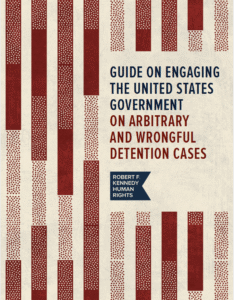This past Tuesday, the United States government failed to appear in two hearings before the Inter-American Commission on Human Rights (IACHR) concerning its human rights policies. It appeared to be a first for the United States in the IACHR’s nearly 60-year history, and reflects a troubling approach by the current administration to protection and defense of human rights in the United States.
The IACHR is tasked with monitoring the human rights situation in member states of the Organization of American States (OAS). The United States has been a member since the OAS’ inception in 1948. One of the ways it monitors human rights is by hosting thematic hearings on human rights issues of importance that could lead to changes in regional policy and practice.
The first thematic hearing was convoked by the Inter-American Commission ex officio and dealt with some of Trump’s most recent executive orders, including the order to build a wall along the southern border with Mexico, a ban on citizens of certain Muslim-majority countries entering the United States, and approval of high priority infrastructure projects such as the Dakota Access Pipeline. The second was on US policies that prevent access to asylum. Both hearings were attended by a group of more than a dozen civil society organizations, including our frequent partners the ACLU, Human Rights First, and Washington Office on Latin America (WOLA). In addition to the two thematic hearings, the United States was also a no-show at another hearing for a case for redress for acts committed against Japanese-Peruvians by the United States during WWII.
At IACHR headquarters in Washington DC, the Commissioners, including Margaret May Macauley, Special Rapporteur for the United States, began the hearings lamenting the absence of the United States. Regardless, advocates in both thematic hearings used the opportunity to show how the executive orders violated international human rights standards, expounding on the detrimental effects the executive orders and asylum policies will have on individuals and families by presenting stark images of immigrant detention centers and relating stories of victims’ personal suffering.
At a State Department press briefing later in the day, the US government expressed that while it had “tremendous respect” for the IACHR in safeguarding human rights and fundamental freedoms, it was “not appropriate” for the US to participate in an open hearing while litigation was ongoing on these matters. Advocates worried about what it would signal for governments in the hemisphere about their own obligations to respect human rights and engage with the regional human rights system.
The IACHR has been a key mechanism for Robert F. Kennedy Human Rights’ work in the United States, Latin America, and the Caribbean. Partners for Human Rights, the litigation, advocacy and training arm of the organization, has current petitions before the IACHR on behalf of families of victims of police brutality in the US, human rights defenders in Cuba, Guatemala and Mexico, victims of femicide in Mexico, victims of violence against trans people in Honduras, and precautionary measures in place for immigrant detainees in The Bahamas. Robert F. Kennedy Human Rights has also participated in thematic hearings before the IACHR on children’s rights and the media in the United States, the rights of migrants and farmworkers in the United States, and the human rights situation of child victims of trafficking and sexual exploitation in the United States.
The Trump administration’s no-show demonstrates the critical importance of the work of Robert F. Kennedy Human Rights and its partners and the need for increased attention to human rights here at home.




